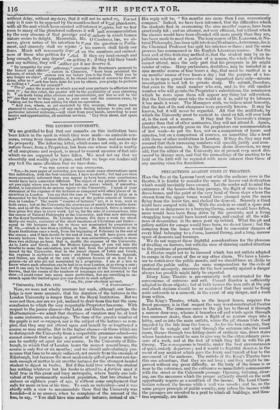PRECAUTIONS AGAINST FIRES IN THEATRES.
HAD the fire at the Lyceum burst out while the audience were in the theatre, it is fearful to consider the scene of horror and destruction which would inevitably have ensued. Let the reader call to mind the entrances of the house—the long passage, the flight of stairs to the dress-boxes, and the point at the very head of those steps where the stream from the upper boxes would have plunged upon the mass flying from the lower tier, and choked the descent. Scarcely a third could have escaped with life. With the rush in so small a space and a descent so dangerous to a hurrying throng, some would have fallen, more would have been flung down by the prostrate, and a living struggling heap would have barred escape, and excited all the wild- ness of desperation in the mass pent up behind. What the pit and gallery outlets for escape would have been, we do not know; but the company from the boxes would have had to encounter dangers of every kind belonging to a.dense, hurried throng, and a long, narrow space of descents and turnings. We do not suggest these frightful considerations for the pleasure of dwelling on horrors, but with the view of drawing excited attention to the prudence of precautions. A theatre ought not to be licensed which has not outlets adapted to escape in the event of fire or any other alarm. We have a Licen- ser to watch over the public morals, and we should have ani-Edile to protect the public safety. As some compensation for the evils of theatrical monopoly, measures for the best security against a danger always too possible might fairly be expected. Drury Lane Theatre is pre-eminently well constructed for the convenience of entrance and exit. Covent Garden is sufficiently adapted to those objects ; but at both houses the iron rails at the pay and check stations should be so contrived that they could be flung aside outwards in a moment, in the event of any danger, and a rush from within.
The King's Theatre, which, as the largest house, requires the freest passages, is in that respect the very worst-constructed theatre in London. The immense mass in the pit has to thread it through a narrow door-way, whence it branches off and winds again through two narrower doors, then down a flight of as narrow steps into a lobby, and so into the main outlets, where the pit stream finds itself impeded by the tide from the boxes. As for the box company, they havetall to wriggle and wind through the entrance into the round room, thence through two folding-doors of ordinary size, down stairs whose banisters would be sure to give way to the extraordinary pres- sure of a rush, and at the foot of which they fall in with the pit throng. The consequence is trouble, under the best circumstances of quiet, orderly departure ; and it would be frightful disaster, in the event of any accident which gave the hurry and tumult of fear to the movement of the audience. The outlets of the Kings Theatre have this one advantage, that they are not long ; and they might be im- proved without any great difficulty, as the body of the house is so near to the entrances, and the entrances so immediately communicate with the street or the Colonnade passage. Opening, widening, clear- ing, are the measures which the proper authority should on the next opportunity require as a condition of the licence. The Lord Cham- berlain refused the licence while a wall was unsafe ; and he, on the same proper principle of public security, may refuse the licence while the passages are unsuited to a peril to which all buildings, and thea- tres especially, are liable.


















 Previous page
Previous page